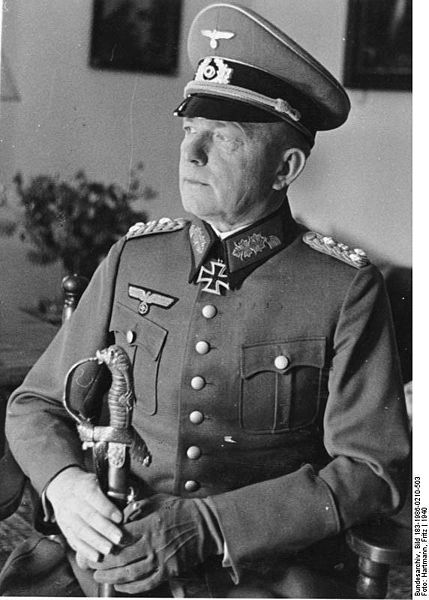<Back to Index>
- Physicist Ernest Orlando Lawrence, 1901
- Novelist Emilie Flygare - Carlén, 1807
- Field Marshal of Germany Paul Ludwig Ewald von Kleist, 1881
PAGE SPONSOR

Paul Ludwig Ewald von Kleist (August 8, 1881 – c. November 13, 1954) was a leading German field marshal during World War II.
Born in Braunfels an der Lahn into an aristocratic family, Kleist was educated in a German military school and graduated in 1900. He served as a lieutenant of hussars and a regimental commander in World War I. After the war he served as a commander of a cavalry division from 1932 - 35.
Kleist was semi - retired when, in August 1939, he was recalled to active duty at the age of fifty - eight.
In the invasion of Poland, Kleist commanded the XXII Panzer Corps. In the Battle of France he commanded Panzergruppe von Kleist, consisting of XLI Panzer Corps and XIX Panzer Corps (under Heinz Guderian), the two southernmost armoured corps in the drive to the English Channel. During this time he attempted to relieve Guderian of his command after he disobeyed orders to halt their advance toward the Channel; the Army Group A commander, Gerd von Rundstedt, refused to confirm the order, and the Franco - British armies were trapped.
In April 1941, Kleist commanded 1st Panzergruppe, comprising III, XIV and XLVIII Panzer Corps and XXIX Infantry Corps, which spearheaded the Blitzkrieg - style invasions of Yugoslavia and Greece. With this formation he also participated in the subsequent Operation Barbarossa as part of Army Group South.
In 1942 Kleist was sent to command troops in the Caucasus in order to capture important oil wells in the area. On 22 November 1942, he was placed in command of Army Group A. He was promoted to field marshal in 1943. He was relieved of his command in March 1944 for ordering the 8th Army to retreat when it was in danger of destruction by the Soviet Red Army, in explicit violation of Adolf Hitler's orders.
Kleist was captured by United States forces in 1945. He was sent to communist Yugoslavia to face alleged war crimes charges in 1946. In 1948 he was then extradited to the Soviet Union where he was condemned to a 10 years sentence in 1952 for war crimes and he died in captivity in Vladimir Prison in 1954. He was the highest ranked German officer to die in Soviet captivity. Of note is the fact that Kleist was charged, among other things, with "alienating, through friendship & generosity, the peoples of the Soviet Union" as described in the book "Hitler's Generals" by Samuel W. Mitcham Jr.